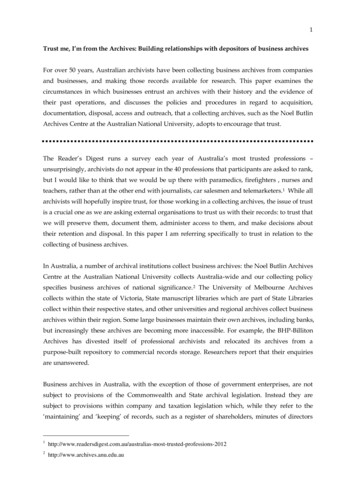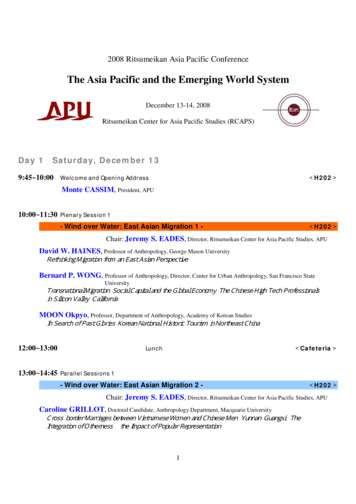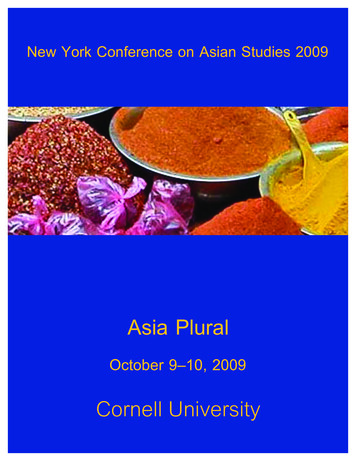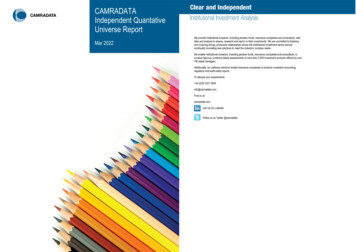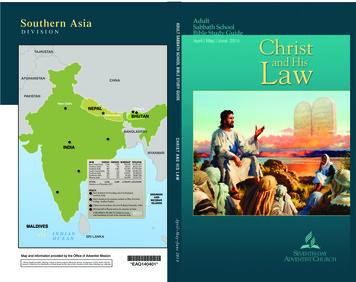
Transcription
ADULT SABBATH SCHOOL BIBLE STUDY GUIDESouthern AsiadivisionTAJIKISTANAFGHANISTANCHINAPAKISTANNew NMARUNION23CHURCHES COMPANIES MEMBERSHIP POPULATIONEast-Central India 2,516Northeast India192Northern India445South-Central India 250Southeast India428Southwest India227Western India2321,5933201,402212822101507950,956 131,852,47849,611 46,821,310152,401 723,915,04972,848 65,402,195119,872 76,284,92536,169 34,865,298143,099 32,021,552TOTAL4,324Statistics as of December 20135,0691,534,593 1,291,678,000CHRIST AND HIS LAW14PROJECTS1Boy’s dormitory for boarding school in Karmatar,northern India2Men’s dormitory for seminary students at Flaiz AdventistCollege, Andhra Pradesh3Classrooms for primary school in Kollegal, Karnataka, India4Meeting hall in Bhutan and seven churches in IndiaANDAMANANDNICOBARISLANDSCHILDREN’S PROJECT: Children’s roomswith furnishings in each of the churches built.nSRI LANKAMap and information provided by the Office of Adventist MissionWhere legally possible, offerings will go to these projects; otherwise special arrangement will be made with theGeneral Conference for distribution of funds based on the laws of the countries where these offerings are collected.nINDIANOCEANApril May June 2014MALDIVES*EAQ140401**EAQ140401*
Contents1Laws in Christ’s Day—March 29–April ��––––62Christ and the Law of Moses—April �–––––143Christ and Religious Tradition—April ��––224Christ and the Law in the Sermon on the Mount—April 19–25––––305Christ and the Sabbath—April 26–May ��–––386Christ’s Death and the Law—May –––––––467Christ, the End of the Law—May ��––––––568The Law of God and the Law of Christ—May 17–23––––––––––649Christ, the Law and the Gospel—May ��––7210Christ, the Law and the Covenants—May 31–June 6–––––––––––8011The Apostles and the Law—June �–––––––8812Christ’s Church and the Law—June ��–––9613Christ’s Kingdom and the Law—June ��–10412501 Old Columbia Pike, Silver Spring, MD 20904Come visit us at our Web site: http://www.absg.adventist.orgEditorial OfficePrincipal ContributorEditorial AssistantEditorPacific Press CoordinatorAssociate EditorArt Director and IllustratorPublication ManagerDesignKeith BurtonClifford R. GoldsteinSoraya HomayouniLea Alexander GreveSharon Thomas-CrewsWendy MarcumLars JustinenJustinen Creative Group 2014 General Conference of Seventh-day Adventists . All rights reserved. No part of the AdultSabbath School Bible Study Guide may be edited, altered, modified, adapted, translated, reproduced, or published by any person or entity without prior written authorization from the General Conference of Seventh-day Adventists . The division offices of the General Conference ofSeventh-day Adventists are authorized to arrange for translation of the Adult Sabbath SchoolBible Study Guide, under specific guidelines. Copyright of such translations and their publicationshall remain with the General Conference. “Seventh-day Adventist,” “Adventist,” and the flamelogo are registered trademarks of the General Conference of Seventh-day Adventists and maynot be used without prior authorization from the General Conference.1
The Law and LoveFrom the very beginning of the great controversy in heaven it has beenSatan’s purpose to overthrow the law of God.”—Ellen G. White, TheGreat Controversy, p. 582.Why? Because the law, as the foundation of God’s government, expresses themoral integrity of the cosmos; and to overthrow that law would be to overthrow themoral order of the creation itself.Think about it. If no god existed, and no life either, the universe would be amoral.Not immoral, as in having bad morals, but amoral, as in having no morals, becausenothing in it—such as lifeless rocks hurling through a godless cosmos—could manifest moral qualities.However, God exists, and humans do as well, and we have been created as moralbeings with the capacity to give and to receive love. For this love to exist, however,freedom, moral freedom, must exist, too, because love is a moral concept that couldn’tarise in an amoral universe (such as one composed of only rocks and cold space).Morality, though, means the ability to choose right or wrong, good or evil—andthe only way for the universe to be moral, to allow the potential for good or evil, forright or wrong, would be for it to have a law that defines right or wrong.And, of course, it does have such a law.“What shall we say, then? Is the law sin? Certainly not! Indeed I would not haveknown what sin was except through the law. For I would not have known what cov-
eting really was if the law had not said, ‘Do not covet’ ” (Rom. 7:7, NIV).Is it sinful to have red hair? Why not? Because God’s law doesn’t forbid red hair.If it did, as the law forbids covetousness, then having red hair would be a sin. But itcannot be sin if no divine law defines it as such.Morality without law is as impossible as is thought without mind. Our universeis moral because God created free beings answerableto His law. If there were no law against coveting,there would be no sin of covetousness; if there wereno law against red hair, there would be no sin of red The link betweenheadedness—no matter how many red-haired coveters our loving Godpopulated the cosmos.and the keeping ofGod created humans as creatures who can love.His commandmentsLove, though, can’t exist without freedom, moralfreedom. And moral freedom can’t exist without law, is stronger thanmoral law. Love rests on freedom, and freedom rests we realize.on law. Hence, the core of God’s government, thefoundation of that government—a government oflove—has to be His law. That’s why Ellen G. Whitewrote what she did about Satan’s desire “to overthrow the law of God.” The attackon the law is an attack not just on Christ’s character but on the moral order of thecreation itself.Hence, the topic for our quarter: Christ and His law. We will study the law, especially the question of why so many Christians—misunderstanding the relationshipbetween law and grace—have fallen into the trap of denying the continued validityof the Ten Commandments, thus, unwittingly helping the attempt to “overthrow”God’s law.The Bible, though, is clear: “For this is the love of God, that we keep His commandments” (1 John 5:3, NKJV). The link between our loving God and the keepingof His commandments is stronger than we realize. We can love God because we livein a universe where love can exist, and it can exist because the universe is moral. Thatmorality is based, at least for us as created beings, on God’s moral law—the subjectwe will now explore.Keith Augustus Burton is a professor of religion at Oakwood University, where he alsoserves as the coordinator of the Center for Adventist-Muslim Relations. His doctoral dissertation from Northwestern University focused on the role of the law in Paul’s letter tothe Romans.
GOD’S PEOPLE are PRAYING andREADING the BIBLE EVERY DAYWON’T YOU JOIN THEM?RENEWEDPRAYERTHROUGHRead through the Bible together Listen to or read the daily Bible chapter Read the Revived by His Word blog Share your thoughts with the RevivedBy His Word community.“No other book is so potent to elevate the thoughts,to give vigor to the faculties, as the broad, ennobling(truths of the Bible. (Stepsto Christ, p. 90).Pray for the Holy Spirit's presence inour families, leaders, churches, andcommunities.Unite with other believers at 7 a.m. and 7 p.m.,7 days a week. Visit the Apple app store todownload the free InPrayer app, featuringdaily prayer reminders.“A chain of earnest praying believers shouldencircle the world . . . to pray for the Holy Spirit”(Review and Herald, January 3, 1907).www.RevivalandReformation.org
Eight Years Later,the Mission DVDis Still FREE!Each quarter, your church receives an official thirteenthSabbath Offering DVD containing 11 feature stories,a children’s story, music, and many extras—professionallyproduced and provided by Adventist Mission.Get yours absolutely free atwww.adventistmission.org/dvd14-2-ABSG DVD Ad BW.indd 18/28/13 11:55 AM
L esson1*March 29–April 4Laws in Christ’sDaySabbath AfternoonRead for This Week’s Study: Luke 2:1–5, Heb. 10:28, Deut.17:2–6, Lev. 1:1–9, Luke 14:1–6, James 2:8–12.Memory Text: “For when Gentiles who do not have the Law doinstinctively the things of the Law, these, not having the Law, are alaw to themselves” (Romans 2:14, NASB).In most societies, various laws function at the same time. There canbe general laws that apply to everyone and, simultaneously, locallaws that prevail in one community but not in another.In New Testament times, when a person used the common word for“law” (nomos in Greek, lex in Latin, and Torah in Hebrew), he or shecould have been referring to any one of a number of laws. Often theonly indicator as to the exact law being discussed was the context ofthe conversation. Thus, as we study this quarter, we’ll always need tokeep the immediate context in mind in order to understand best whatlaw is being discussed.This week’s lesson investigates the various laws that functioned inthe community during the time of Christ and the early church. We willstudy these various laws but only in the context of helping to set afoundation for the study of the law that will be the major focus of thisquarter—God’s moral law, the Ten Commandments.* Study this week’s lesson to prepare for Sabbath, April 5.6
S unday March 30Roman LawRead Luke 2:1–5. What lessons can we learn from the ways in whichthese two faithful followers of the Lord interacted with their political environment?Since the time of the early republic, the Romans recognized howimportant written laws were for the governance of society. In fact,the system of constitutional law established by the Romans remains afoundation of the legal systems found in many of today’s democraticsocieties.For the most part, Rome allowed vassal kingdoms to maintain theirown customs, but all subjects were expected to obey imperial and senatorial laws. Obviously, this included Joseph and Mary.Roman law was concerned with order in society. As such, it notonly addressed issues of government but also legislated behavior inthe domestic arena. In addition to stipulating the procedures for selecting people to public office, Roman law also dealt with things such asadultery and master/slave relationships. Many of the social codes aresimilar to the ones found in the Old Testament and other societies.All attempts to understand the culture in which the New Testamentbooks were composed must take into account the fact that the RomanEmpire formed the political backdrop for the world in which Jesus andthe early church lived. Many things taking place in the New Testament,from the death of Jesus to the imprisonment of Paul, make much bettersense when we understand whatever we can about the environment oftheir times. Of course, one doesn’t need to be a scholar of Roman history in order to understand that which we need for salvation. However,when it is possible for us to obtain it, historical knowledge can indeedbe helpful.Despite the amazing providences of Mary’s pregnancy and theobvious hand of the Lord in it, these two people still obeyed thelaw of the land, which required them to leave their home, evenwhen Mary was quite far along in her pregnancy. Would it nothave been better simply to have stayed home, considering theextraordinary circumstances? What might their actions say to usabout how we should relate to civil law? (Think how easy it wouldhave been for them to have justified not obeying.)7
M onday March 31Mosaic Law: CivicAlthough the Jews were under Roman rule at the time of Jesus,they were granted authority over those issues that were unique to theircustoms and religion (see Acts 18:15). The legislative body responsiblefor administering Jewish law was called the Sanhedrin. Sometimesreferred to as the council (John 11:47, Acts 5:27), the Sanhedrin consisted of 71 men selected from among the priests, elders, and rabbisand was presided over by the high priest. It served as a type of SupremeCourt that dealt with Jewish customs, traditions, and laws.Jewish societal law was founded upon the civil codes revealed inthe five books of Moses. Because Moses was the author of the firstfive biblical books, the laws are referred to as the law of Moses. WhenGod originally gave the laws to Moses, He envisioned a state where Hewould be the head and the people would enforce His legal mandates.By the time of Jesus, the Jews were subject to Roman law. However,the Roman government allowed them to use Mosaic law in order tosettle issues relating to their customs. Here is where the work of theSanhedrin was especially important.The New Testament provides several examples of the Mosaic lawbeing applied, or alluded to, in civic matters: Jewish men were stillexpected to pay the half shekel temple tax (Matt. 17:24–27, Exod.30:13); divorces were still being governed by the stipulations set forthby Moses (Matt. 19:7, Deut. 24:1–4); people still adhered to the law oflevirate marriage, in which a widow was to marry her husband’s brother(Matt. 22:24, Deut. 25:5); boys were still circumcised on the eighth day(John 7:23, Lev. 12:3); and adulterers were to be punished by stoning(John 8:5; Deut. 22:23, 24).Read Matthew 26:59–61, Hebrews 10:28, and Deuteronomy 17:2–6.What important principle is seen here? What does this tell us aboutbiblical concepts of justice and fairness?Read some of the civil legislation found in the early books of theBible. Some of those laws do seem strange to us, don’t they? (See, forexample, Deuteronomy 21.) Considering who the Author is of theselaws, what should this tell us about how we must learn to trust theLord in all things, especially those things we don’t fully understand?8
T uesday April 1Mosaic Law: CeremonialRead Leviticus 1:1–9, 2:14–16, 5:11–13. To what are these laws referring? What was their purpose? What important truths were theymeant to teach?Besides the civil laws in ancient Israel, there was also what is oftencalled the “ceremonial law.” This law centered around the sanctuary andits services, all of which, of course, were designed to teach the childrenof Israel the plan of salvation and point them to the coming Messiah.In the texts for today, twice it is mentioned that through these services,“atonement” would be made. In their own way, these laws were whathas been deemed “miniprophecies” of Christ and His work of atonement for the sins of His people.“The ceremonial law was given by Christ. Even after it was no longerto be observed, Paul presented it before the Jews in its true position andvalue, showing its place in the plan of redemption and its relation tothe work of Christ; and the great apostle pronounces this law glorious,worthy of its divine Originator. The solemn service of the sanctuarytypified the grand truths that were to be revealed through successivegenerations. . . . Thus through age after age of darkness and apostasyfaith was kept alive in the hearts of men until the time came for theadvent of the promised Messiah.”—Ellen G. White, Patriarchs andProphets, p. 367.Though instituted by Jesus, the ceremonial system was meant tofunction only as a type, a symbol of a future reality—the coming ofJesus and His death and High Priestly ministry. Once He completed Hiswork on earth, this old system—along with its sacrifices and rituals andfeasts—no longer was needed (see Heb. 9:9–12). Though we no longerkeep the ceremonial law today, by studying it we can garner insightsinto the plan of salvation.Central to the sanctuary service was the sacrifice of the animals,which pointed to the death of Jesus. Think what it means that oursalvation could come only through His death on our behalf. Whatshould this tell us about just how costly sin is?9
W edne sday April 2Rabbinic LawIn addition to the Mosaic laws, Jews at the time of Jesus were alsofamiliar with the law of the rabbis. The rabbis were the scholasticarm of the Pharisees, and they took the responsibility of ensuring thatthe Mosaic law remained relevant to the people. The rabbis counted613 laws in the five books of Moses (including 39 pertaining to theSabbath), and they used these laws as the basis for their legislation.They supplemented these written laws with an oral law that consistedof the interpretations of leading rabbis.Oral law is known as halakah, which means “to walk.” The rabbisfelt that if the people adhered to their numerous halakoth (plural ofhalakah), they would walk in the way of the 613 major laws. Althoughoriginating as oral law, the rabbinic halakoth were collated andrecorded in book form. Some of the interpretations from Jesus’ daysurvive in commentaries known as Midrash, while others are recordedin a legal collection called Mishnah. Many religious Jews through theages, and even today, seek to adhere strictly to these laws.Read Luke 14:1–6 and John 9. Although Jesus was accused of violat-ing the Sabbath with His miraculous healings, where can you findin the Old Testament that it’s a sin to heal on the Sabbath day?How does the answer help us to understand some of the issues withwhich Jesus had to address? More important, what lessons can welearn from these incidents that could help us to make sure that wedon’t make similar mistakes in our attempts to “walk in the way”faithfully?Though it’s easy from our perspective today to deride many of theseoral laws, especially when they were used as they were against Jesus,the fault exists more with the attitude of the leaders and not with theselaws themselves. Though often kept very legalistically, halakoth weremeant to be very spiritual, infusing a spiritual element into the mostmundane of actions, giving them a religious significance.How can we learn to give even the most mundane tasks a religioussignificance?10
T hursday April 3The Moral LawHowever much Roman law, Mosaic law, and rabbinic law impactedthe lives of Jews living in first-century Israel, many people who followed the religion of Israel lived outside of Palestine and beyond theborders of the Roman Empire. Thus, many of these laws would nothave played a big role in their lives.At the same time, however, anyone professing to be a follower of theGod of Israel would have adhered to the Ten Commandments.“The Ten Commandments provide Israel with the moral frameworkfor maintaining it [their relationship with God]. The metaphor that theBible uses to express this relationship is covenant. While the metaphorcomes from the sphere of international law, it is wrong to understandthe commandments merely as a summary of Israel’s obligations towardGod. . . . Israel’s obedience to the commandments was not a matter ofsubmission to the divine will as much as it was a response to love.”—Leslie J. Hoppe, “Ten Commandments,” Eerdmans Dictionary of theBible (Grand Rapids, Mich.: Eerdmans, 2000), p. 1285.The Ten Commandments surpassed any system of law known toJews in the first century. Even the Pharisees, who had meticulouslymemorized the 613 Mosaic laws, recognized the importance of theTen Commandments. The division of the Mishnah called Tamid(5:1) contains a rabbinic command to recite the Ten Commandmentsdaily. It was believed that all the other laws were contained in the TenCommandments. In fact, the Jewish philosopher Philo, who was a contemporary of Jesus, wrote an entire book on the central place the TenCommandments held among all biblical law.Read Matthew 19:16–19, Romans 13:8–10, and James 2:8–12. Whatdo these verses say about the role that the Ten Commandments playin the lives of those who are followers of Christ?Like their Jewish counterparts, the inspired writers of the NewTestament recognized the purpose of the Ten Commandments forGod’s people. Although some of the lessons for this quarter will discuss the way in which Christ interacted with other systems of law inHis day, the primary emphasis will be on His relationship to the TenCommandments—what is often known as “the moral law.”11
F riday April 4Further Study: Read also Ellen G. White, “Oath Taking,” pp. 201–204, in Testimonies for the Church, vol. 1.“If Adam had not transgressed the law of God, the ceremonial lawwould never have been instituted. The gospel of good news was firstgiven to Adam in the declaration made to him that the seed of the womanshould bruise the serpent’s head; and it was handed down through successive generations to Noah, Abraham, and Moses. The knowledgeof God’s law, and the plan of salvation were imparted to Adam andEve by Christ Himself. They carefully treasured the important lesson,and transmitted it by word of mouth, to their children, and children’schildren. Thus the knowledge of God’s law was preserved.”—Ellen G.White, Selected Messages, book 1, p. 230.Discussion Questions: Long before Moses penned the laws that were to govern Israel,the Egyptians and Babylonians had systems of societal laws thatwere, in some cases, similar in content to some of God’s laws. Evenatheistic societies have laws that protect people and property.Law, though, is often based on moral concepts; that is, law shouldencourage people to refrain from certain types of evil and to docertain types of good. From where, though, do societies get theirsense of good and evil? How does the whole concept of good and evil impact the ques-tion of God’s existence? In other words, if there is no God, fromwhere do the concepts of good and evil come? From where is theonly place that they could come if no God existed? We often use the concept of “law” in different ways. We talkabout the law of gravity, the law of motion. We talk about international law. We talk about the law of the land. We talk about tax law.What do all of these laws have in common? In what ways do theydiffer? What is the probable consequence of violating any of theselaws? What are the benefits of cooperating with these laws? Howdo the principles of law help you to understand the purpose of theTen Commandments as it relates to the life of believers? In class, go back to Wednesday’s lesson and deal with the issueof how we as a church need to be careful that we don’t make thesame mistake that some of the leaders did by adding burdens tothe law that were never meant to be there. Why is such a mistakeeasier to make than we might think, no matter how well-meaningwe might be?12
Storyi n s i d eA Life of InfluenceElizabeth Kimongo was born into a traditional Maasai family inKenya. In her culture, girls are expected to marry soon after their twelfthbirthday. Women have little say about their lives, but Elizabeth refused toleave school to marry. She had a dream.While home for vacation before starting high school, Elizabeth learnedher father had arranged for her to marry an older man. With her mother’sblessing, she escaped and returned to her Seventh-day Adventist school.During high school, Elizabeth took her stand for Christ and laterwas baptized. When she told her mother that she wanted to study at theAdventist university, her mother encouraged her to go.Elizabeth is majoring in agriculture, a field that will help her teach herpeople how to preserve their land and provide a better life. She works oncampus and receives some scholarship funds to help her pay her schoolfees. Sometimes she must take a semester off to work full time to earnthe money to continue her studies.Elizabeth’s example has helped her younger sisters stay in school andavoid early marriage. Her father, once angry that his daughter wouldrefuse to marry the man of his choice, now accepts her decision. But hepressures her younger sisters to marry this man. Elizabeth encouragesher sisters to walk close to God and to continue their studies to make abetter life.Elizabeth urges other Maasai girls to study hard and trust in God.“Don’t allow life’s circumstances to steal your life away,” she says. “Satanwants to destroy you. You must trust God and not let Satan have his way.”Elizabeth is old enough now that her community will not force her tomarry. They accept her as an adult woman who can make her own decisions. “I want to teach my people by example how to produce better cropsfor a better life,” she says. “The village has given me a piece of land thatI use to plant crops so that my fellow villagerscan see for themselves the success they canhave by following my example.”Elizabeth is grateful for Adventist schoolsthat have prepared her to live a life of influence among her Maasai people. Our missionofferings and Thirteenth Sabbath Offeringshelp these schools reach young people in allwalks of life, including Maasai girls in theheart of eastern Africa. Thank you.Elizabeth Kimongo will soon complete her studiesand return to her village to work for her people andshare God’s love among them.Produced by the General Conference Office of Adventist Mission.Web site: www.AdventistMission.org13
L esson2*April 5–11Christ and the Law ofMosesSabbath AfternoonRead for This Week’s Study: Luke 2:21–24; Exod. 13:2,12; Luke 2:41–52; Matt. 17:24–27; John 8:1–11; Deut. 22:23, 24.Memory Text: “ ‘If you believed Moses, you would believe me, forhe wrote about me’ ” (John 5:46, NRSV).Many Christians have been raised on stories about Jesus’supposedly negative relationship to the Jewish religion, anunfortunate misconception that has only helped feed antiSemitism through the centuries. Jesus spoke out against abuses of thereligion, that’s true, but not against the religion itself. After all, He wasthe founder of it.Indeed, the Gospel accounts of His life and ministry show that Jesuswas a faithful Jew fully immersed in Jewish culture from the momentof His birth to the final week of His life in human flesh.Like every loyal Jew in the first century, Jesus was subject to theMosaic law. Raised in a home with loyal Jewish parents, He fullyappreciated His rich earthly heritage, which was rooted in Divineprovidence. He knew that God Himself had inspired Moses to pen theselaws, with the purpose of creating a society that reflected His will andserved as a beacon to the nations. He adhered faithfully to the letter ofthe law. From circumcision to His visit to the temple to the feasts and toHis attitude about taxes, Jesus remained steadfastly faithful to a systemthat, He knew, would over time be fulfilled through His death and Hisministry in heaven.This week we’ll look at more of the laws that Jesus Himself kept.* Study this week’s lesson to prepare for Sabbath, April 12.14
S unday April 6Circumcision and Dedication(Luke 2:21–24)God established His covenant with Abraham, saying that he would bethe father of many nations (Gen. 17:4). When God made this covenant,the 99-year-old Abraham had only recently fathered Ishmael and hadnot yet seen the birth of his promised son, Isaac. Nonetheless, he wascommanded to circumcise himself along with every male member ofhis household, and he was instructed to ensure that every son born intohis household from that day forth be circumcised on the eighth day(Gen. 17:9–12). So important was this sign that the circumcision tookplace even if the eighth day fell on a Sabbath (Lev. 12:3, John 7:22).This truth gives us a better understanding of the earliest days ofJesus’ life. The Gospels do show that Joseph and Mary were chosento be the earthly parents of Jesus at least in part because of their piety.Joseph is described as a “righteous man” (Matt. 1:19, NASB), andMary is said to have “found favor with God” (Luke 1:30, NASB). WhenJesus was eight days old, His parents held a naming and circumcisionceremony in the same manner as an untold number of Hebrew maleshad experienced in times past.Imagine, the spotless Son of God, now in human form, undergoingthe very ritual that He Himself had instituted many centuries earlier!Read Luke 2:21–24 in light of Exodus 13:2, 12 and Leviticus 12:1–8.What more do these texts tell us about Joseph and Mary? Whatcan we learn for ourselves, in our own time and sphere, from theirexample?The Bible is clear that Mary was a virgin when she was chosen tobe the mother of Jesus (Luke 1:27); so, Jesus was the first child that“opened her womb.” According to Exodus 13, every firstborn amongthe Israelites (whether animal or human) was to be dedicated to theLord. The law also stipulated in Leviticus 12:2–5 that after the birthof a male child, the woman was ceremonially unclean for a total of 40days (80 for a female child). At the end of this period, she was requiredto show herself to the priest and offer a sacrifice. As pious Jews, Maryand Joseph meticulously fulfilled the obligations of the Mosaic law andensured that the Son of God bore the marks of the covenant.15
M onday April 7Jewish Feasts(John 5:1)“After this there was a feast of the Jews, and Jesus went up toJerusalem” (John 5:1, NKJV).The first major festival period in the Jewish calendar year isthe seven-day Feast of Unleavened Bread, which commences withPassover. The festival commemorates the deliverance of the Israelitesfrom Egyptian slavery, when the angel of death passed over the homesof those who put the blood on their doorposts. The Gospels recordthree occasions when Jesus celebrated Passover (Luke 2:41–43, John2:13–23, Matt. 26:17–20).Fifty days after Passover came the feast of Shavuot, often referredto by its Greek name, Pentecost. Although the Scriptures don’t providea reason for Pentecost, the rabbis believed that it commemorated thegiving of the law to Moses. There is no record in the Gospels that Jesuscelebrated Pentecost. However, before His ascension He counseled Hisdisciples to wait in Jerusalem for the baptism of the Holy Spirit (Acts1:4, 5). This event actually occurred on the Day of Pentecost (Acts2:1–4).The final festival season in the Jewish calendar were the Feast ofBooths (Tabernacles) and the Day of Atonement (Yom Kippur). TheDay of Atonement signifies the day on which sin was
Southern Asia. division *EAQ140401* Where legally possible, offerings will go to these projects; otherwise special arrangement will be made with the . College, Andhra Pradesh. 3. Classrooms for primary school in Kollegal, Karnataka, India. 4. Meeting hall in Bhutan and seven churches in India . BIBLE EVERY DAY. R. ENEWED. P. RAYER. THROUGH .

